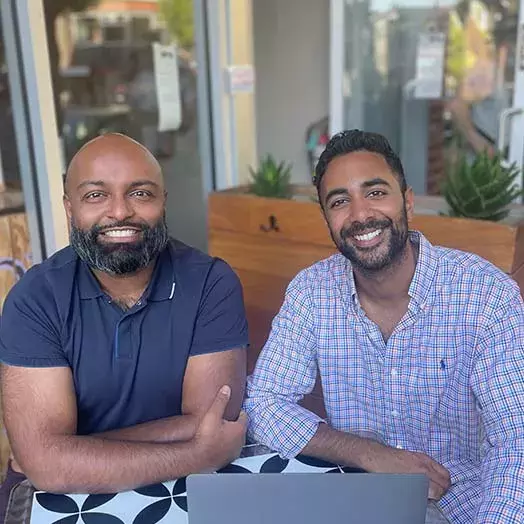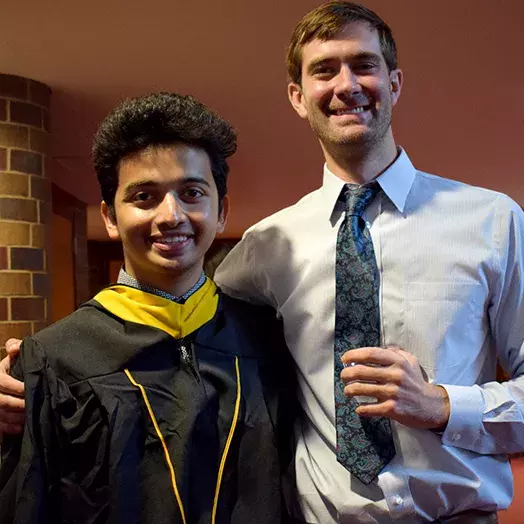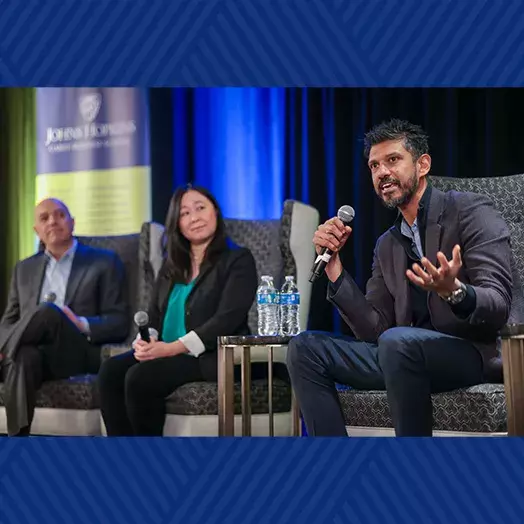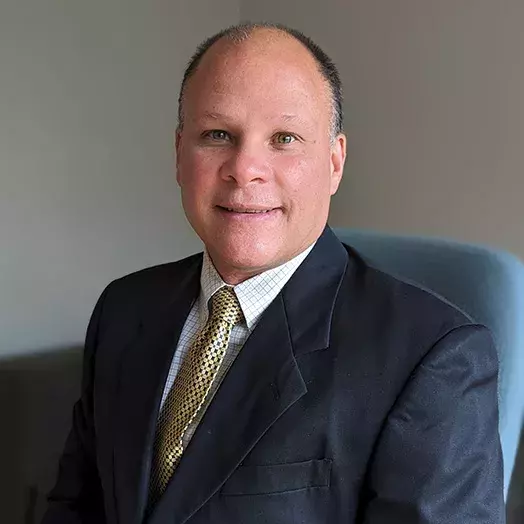
A joint venture: MBA alums co-found stealth startup to tackle the gaps in patient equity
Some friends meet for coffee to catch-up; others meet for coffee and start a business.
Abe Abraham (MBA ’15) and Shashi Shankar (MBA ’20) are both graduates of Carey Business School, but longtime friends from their days working in the biotechnology industry. They meet regularly over coffee to discuss their latest adventures and aspirations for the future.
A coffee catch-up turned those aspirations to reality and the pair are now co-founders of a stealth startup working to bring actionable patient equity to the head of the table.
Pursuing an MBA
When Abraham was pursuing business schools, he knew he wanted to better understand the business world to build upon his extensive background in health care. He chose Johns Hopkins MBA program because of the resources and reputation Carey Business School offered.
While discussing his time in the MBA program with Shankar, Abraham raved about his ability to work with small businesses, both within the Baltimore community and internationally, through Carey’s experiential learning programs. His experience left Shankar feeling like it was the right time to pursue an MBA of his own.
“If Carey was able to help Abe, who is one of the sharpest people I know, I knew it could definitely help me as well,” Shankar said.
Shankar chose the Johns Hopkins MBA program not only because of his friend’s newfound knowledge, but because of his strong desire to one day become an entrepreneur. He quickly realized he had an informal understanding of how to run a business, so he enrolled at Carey.
“Since Carey’s values are rooted in building what’s next for your future, I knew I would get an invaluable education learning from top professors in the country on how to create a business,” Shankar said.
A personal touch
While working in the biotechnology industry, the two quickly learned of the large gaps that exist in patient equity.
“The inequities go beyond just care. It’s the lack of information, data, accessibility, and more. For Shashi and me, we believe that patients are first,” Abraham said.
But it was also personal. Inequities in the health space around data and lack of information hits close to home.
“My grandfather passed away much before his time because the therapy he needed, an immunotherapy drug, didn’t have enough data to make it to market. Soon after he passed, the drug made it to market and I kept thinking, if we could get these types of life saving drugs to market faster, just imagine how many lives would be saved,” Shankar said.
And for Abraham, despite being a medical professional, he says it took his family months to receive the information they desperately needed for his mother’s disease.
“My mom’s story represents so many patients these days when it comes to information around their diseases and being able to take ownership of their own health. My family had to do a lot of work to get the information to make better decisions in terms of trade-offs for something as expensive and experimental as stem cell transplants, but also as potentially lifesaving,” Abraham said.
With patient equity teetering before their eyes, they chose to leave their careers and begin a journey to drive hypothesis testing towards better outcomes for inequities in the health care space.
Bridging the gaps
After leaving the biotechnology industry, the two are advocating for a patient-first approach to identify inequities and sustainable solutions to tackle health care’s largest gaps. While the pathway to accelerating saving lives is through real-world health data from patients, the two co-founders recognized an important foundation when collaborating – trust and transparency with the community.
They are now partnering with patients and delivering on one of the largest existing inequities – simple, actionable information for patients.
In the few short months since announcing their startup, the two have seen unprecedented growth from their community. Their user base has grown over five times the amount from when they started, with no help from advertising or marketing.
“I spent the last several years in global digital health, and I've never seen growth or engagement numbers like what we're seeing. For example, our weekly newsletter is now read globally and has four times the metrics than any other newsletter of its kind. I could say the same about our other products, too. It’s clear we’re resonating,” Shankar said.
The startup acts as a two-sided coin; serving and building the community while also delivering value for the life sciences in order to advance innovation.
Shankar says they will continue to provide information that’s valuable and actionable so patients can partake in productive conversations with their providers around things like new therapies, clinical trials, and beyond.
“This gives patients the opportunity to own their disease and even lessens the burden of the provider, who may come to the table with biases or potential considerations that they might not be aware of about the disease. We are empowering patients to be their own stakeholders and on equal grounds as their providers,” Abraham said.
“Since Carey’s values are rooted in building what’s next for your future, I knew I would get an invaluable education learning from top professors in the country on how to create a business."
Shashi Shankar
Next steps
On the horizon for the stealth startup, the pair says they are thrilled with the unprecedented attention from investors. They will finish investment opportunities, continue to grow their community, and partner with patients to deliver the next generation of precision health care – one with patients at the head of the table.
The two are also in the process of building a new product to reimagine what living with chronic health conditions can – and should – look like. The product will stay under wraps until finalized, but Shankar shared they are more excited about it than anything they’ve done up to this point.
“There is nothing like this out there yet. We are partnering with the top voices in the patient and health care community and taking on some of the most established power players in health care, but we've got a feeling that our patient-partnership approach to building this business is going to take us the distance,” Shankar said.
What to Read Next

career outcomes
Carey alums launch biotech company, aim to lower price of synthetic insulinLeveraging their Carey MBA’s
While the two are building an empire, they have not forgotten their roots. Abraham and Shankar reference their time at Carey daily.
“I use my Carey degree every day, even in my personal life. But the most useful thing Carey taught me was negotiation. Especially for where we are in building our startup. We know the value behind what we are building, and we are confident in our outcomes. Carey taught me how to confidently tell investors what the value of our company is, rather than letting investors tell us,” Shankar said.
“Medicine taught me that I can give you a diagnosis from a set of symptoms. But Carey taught me how to take real world business problems and ask better questions that lead to more sustainable solutions. Applying a hypothesis testing approach to health care problems has helped me stand out in industry and today, it helps Shashi and I guarantee patient equity and high impact in all that we co-create for patients,” said Abraham.
Abraham and Shankar’s parting words come as no surprise.
“We want to change and improve patient lives and we know this can only be done with the right people; those who have a background in business and health care. So, we are leveraging our education, being true to science, and protecting the lives of those we are helping.”


